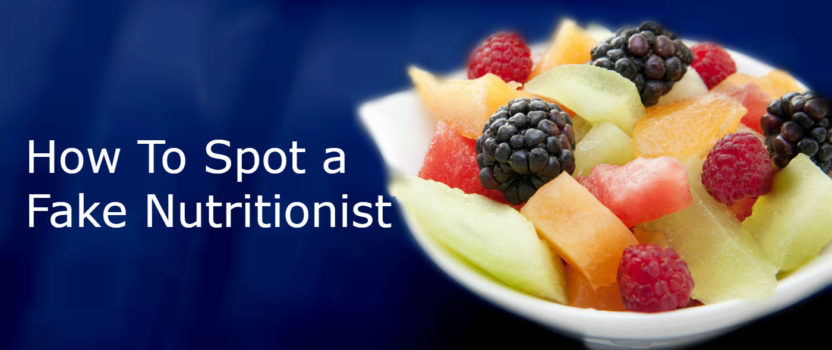HOW TO SPOT A FAKE NUTRITIONIST
With everyone from personal trainers to health coaches dishing out nutritional advice, could you be leaving your health in the hands of an under qualified “professional” rather than a properly qualified nutrition expert?
As a licensed nutritionist with a Bachelor of Science (BSc) in Nutritional Health, I’m often asked about the various “nutrition gurus” that are popping up left and right. Increasingly, I’m also asked to “mop up the damage” with disappointed clients misled by “self-appointed experts” who have misrepresented their nutritional knowhow.
Rule 1: Does my dietary guide have a nutritional license?
Obtaining a license from a fully-accredited institution – ideally one with a reputation for academic excellence – is the best guarantee to ensure genuine credibility.
My fascination with how food choices affect physical and mental health is lifelong, but it took five years of full time study to earn the necessary qualifications to be considered an authority on nutrition. I trained with BCNH College of Nutrition and Health, widely accepted as among the most prestigious and demanding in the world. Before enrolling, I had to complete a year’s foundation course in advanced chemistry and biology. Most of us already had a university degree and were well acquainted with the rigors of evidenced-based research.
Rule 2: Understand that (licensed) nutritionists and dieticians are united
Despite differences in philosophy and approach, both play a particularly helpful role in educating patients about proper nutrition and improving people’s health.
- Nutritionists help patients reach their health goals by identifying underlying factors, correcting nutritional deficiencies and prescribing specific diets, supplements and diagnostic tests. A holistic nutritionist also considers environmental, psychological and emotional factors.
- Dieticians complete a four-year degree and log in hundreds of hours of rigorous internship. They usually work within institutional settings (hospitals, nursing homes) and often work with doctors and other healthcare professionals to coordinate medical and nutritional needs.
Remember that registered dieticians and licensed nutritionists are professionals that have accredited nutrition degrees and took universally-accepted exams. Other nutritional titles – including health coach – require very little training.
Rule 3: Know that anyone can call themselves a “nutritionist”
Many who call themselves “nutritionists” lack proper credentials, which is both confusing and unhelpful to the public. The title alone is not enough to indicate whether the person has Ph.D. level training or simply completed a 6-month part-time course.
Those seriously involved in the profession are working to establish standards of training and practice. In the UK, there is now a petition to make “nutritionist” a legally protected title. Until that time, choose only nutritionists with a fully-accredited license.
Rule 4: Credibility matters
You probably know someone who’s a health coach. Perhaps they studied at the “World’s Largest Nutrition School”, notoriously heavy on marketing and light on substance. Open to anyone who can pay the tuition it avoids the academic focus of more intense courses and does not teach how bodily systems work. Many of the nutritional theories it covers not only clash with science, but also with each other.
Health coaches can help motivate people to fulfill their health goals, however their lack of in-depth knowledge means that their recommendations can be inaccurate and sometimes even harmful.
Don’t get me wrong: health coaches can provide valuable support and guidance. Just remember that all are not created equal. Investigate their education and experience.
Rule 5: Avoid mistakes by checking credentials
Don’t be fooled by “certifications” and fancy-looking stamps. There are only two things that guarantee you will receive balanced and correct nutritional information from a qualified professional – either an undergraduate (BSc Hons) or postgraduate (MA) degree in a nutritional science, plus at least three years of professional experience.
The Bottom Line
There simply is no substitute for rigorous education in the field of nutrition as all recommendations should be supported by science. Make sure your nutritional advice comes from a well-qualified practitioner licensed by a reputable institution that covers nutrition science, biochemistry, physiology, anatomy, and other related topics.
Remember, your health is your most important asset. Take the time to choose your advisor wisely. A good decision will equip you with all the tools you need to reach your optimum health.


Leave a Reply
Your email is safe with us.
You must be logged in to post a comment.